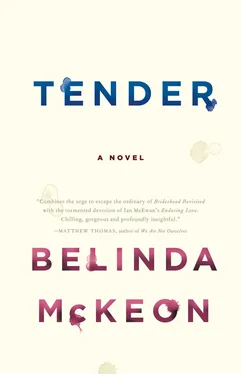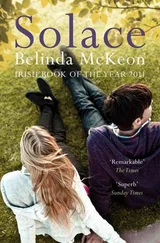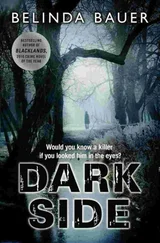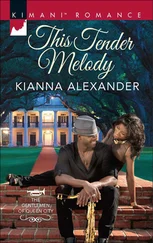“Christian’s not mad about it,” James said. “I told you that, didn’t I?”
“I think you mentioned — he thinks he looks old, or something?”
“Something like that,” James said, shaking his head. “If he wanted to look good in photographs, he should have married Juergen.”
The women laughed. “Not really an option,” one of them said.
“Ah, now, you wouldn’t know that either,” said James. “Don’t forget Christian is very persuasive.”
Then they were leaving, James having talked Meghan into telling him the name of the collector who was likely to be buying the portrait; as was often the case, there were a number of offers, and it was up to the gallery to decide on the most desirable buyer.
“Oh,” James had said, looking impressed. “OK. He’ll do.”
Meghan widened her eyes. “Right? But I didn’t tell you that.” She poked him in the chest. “I did not tell you that.”
“He’ll give Christian a good home. Possibly better than I do.” He checked his watch. “I need to get into the city to get him a gift.”
Meghan reached for her iPhone. “Do you want me to get you the car?”
“No, no,” James said. “It’s a beautiful day. I think I’ll walk over the thingy, the footbridge.”
Meghan made a face. “Are you sure?”
“Yeah, yeah. It’ll be nice by the water. I can take a cab at First Avenue.” He looked at Catherine. “Will you walk me? Or do you have to be somewhere?”
They were looking at the East River, James explained, and the brown high-rise buildings on the other side were East Harlem, and the highway frantic with yellow cabs was the FDR. She was struck by the sounds of these names in his mouth, how thoroughly they seemed to belong to him, how he talked now about needing to get down to the Sixties and then down to Orchard and Hester for a meeting. Catherine had been to New York several times on business, but still the street names and the neighborhoods seemed so exotic to her, seemed somehow unreal; she felt self-conscious using them, and always expected others to be the same.
“Do you live near here?” she said to him. “Or, rather, where do you live? Not in Manhattan, right?”
No, not in Manhattan; she knew that. She knew that from the articles. He lived in Brooklyn, in a house for which he and Christian had paid $1.8 million.
“No, not in Manhattan,” James said, shaking his head as though she had mistaken him for someone else. “In Brooklyn. Fort Greene. Do you know it?”
“No. Sounds nice.” Sounds nice? What was she saying? She was gabbling. With every sentence, she was hissing at herself to stop, to slow down, to let him do the talking, but always already the next sentence had fallen out of her helpless mouth. James must surely have noticed. But he gave no sign of it. He paid, now, for the two iced coffees he had ordered for them from a truck parked at the tent entrance.
“Thanks,” she said, as he handed her the plastic cup. “I meant to say, I like the braces.”
“Oh.” He gave a short laugh, glancing down at himself. “ Bejaysus, you’re like old Barney Rodgers of the mountain. That’s what my ol’ fella said when he saw them.”
“Have they been over?”
“Oh, yeah. A few times. For the”—he nodded backwards, as though at something they had just walked past—“wedding, and then a few other times besides that.”
“That’s lovely. Congratulations, by the way.”
“Thanks.”
“On everything, really,” she said, feeling a sudden impulse to shove a great many things together into a hole. “I meant to write—”
“I was sorry to hear about you and Lucien,” he said, talking over her. “I’m still in touch with Zoe on Facebook. She mentioned it.”
“Oh, thanks,” Catherine said with a shrug. “It’s for the best, probably.”
“Still, it’s hard,” he said, and he pointed to the path down by the water, to indicate that they should go that way. “I don’t remember Lucien very well, I have to admit.”
“Well, he was with Zoe when you would have known him. It was years later when I met him again in London. He’s with The Guardian. ”
“Yeah, I’ve read a few things. He’s good.”
“He’s brilliant.” She nodded. “We’re still friends, you know, it’s just…”
“Yeah,” he said, unevenly, and that hung between them, the brokenness of it, the awkwardness. How had she steered them, so quickly, into that water? Because she had kept talking, she told herself. Because she had obeyed, as always, the temptation to elaborate.
“My mother loved him,” she forged on then, immediately, without any idea of where she was going with this — this anecdote, she realized, this completely unnecessary and not even entirely true anecdote. “The two of them used to sit in the conservatory, when we were over visiting, and watch the tennis.”
“Tennis!”
“On the TV, obviously. As opposed to out in the garden. The Celtic Tiger wasn’t that good to them at home.”
“Still, though, a conservatory. Mammy Reilly at least got something nice under the tree.”
“She’d rather her nice English son-in-law, I think, and no conservatory.”
“Ah, well,” James said, raising his eyebrows. “Sure you can get her another one.”
“I don’t think so,” Catherine said, more darkly than she had intended.
“And how’s your father doing?”
“Oh, great,” Catherine said, shrugging. “He voted for David Norris in the presidential election last year. He was raging he didn’t win.”
“Oh, yeah?”
“Oh, yeah. All change.”
James said nothing, but gave a short nod. They passed fishermen waiting by the water’s edge; were passed by cyclists, dog walkers, a woman on rollerblades, a child on a narrow red scooter. The gravel crunched as they walked. The grass on either side of the path was patchy, humiliated-looking; with borders of daffodils and other plantings, attempts had been made to make this into a pleasant municipal space, but the ground seemed unhealthy, exhausted; polluted, probably, by the river. It looked like the ground at the edge of one of the abandoned housing estates she had seen at home: scraggy, brownish, littered with stones. Those were dandelions underfoot now, and beer caps. To their right, the drop to the water was marked with large square boulders set into the earth. The river was gray. On the other side, she could make out some of the brand names emblazoned on a building: Costco, Target. The next building looked like a courthouse, and beyond that more of the high-rise brown blocks that must have been apartments; projects, the word came to her suddenly. It could have been any city. It looked to her nothing like New York; there was none of the familiar glint and soar of the skyline, none of its narcotic, cinematic glow.
“Zoe’s kids are cute, aren’t they?” she said then, reaching for an easy, airy tone. “I love the photo she put up last week.”
James made a noise of agreement, a fond sort of grunt, and took another slug of his coffee. Seeing this, Catherine did the same, although the sharp coldness of the liquid baffled her; it was so aggressive, somehow.
“Why do Americans drink this stuff?” she said, shaking her cup in front of her. “I never understand it.”
“Are you still in touch with any of the rest of them?” James said, not seeming to have heard her; he was frowning at his straw, fiddling with it; the friction of plastic on plastic made a dull clicking sound. He looked at her.
Catherine felt the need to swallow. “Not really,” she said, afterwards. “Facebook, a few people. I hear from Conor now and then. He’s a big-shot playwright now, you know?”
Читать дальше












